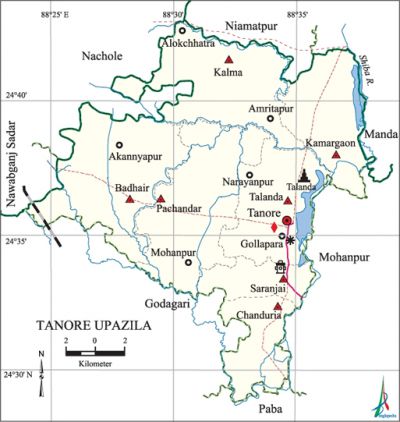Tanore Upazila
Tanore Upazila (rajshahi district) area 295.40 sq km, located in between 24°29' and 24°43' north latitudes and in between 88°24' and 88°38' east longitudes. It is bounded by nachole and niamatpur upazilas on the north, paba and godagari upazilas on the south, mohanpur and manda upazilas on the east, Nachole, nawabganj sadar and Godagari upazilas on the west.
Population Total 191330; male 94041, female 97289; Muslim 162018, Hindu 15152, Buddhist 17, Christian 9329 and others 4814. Indigenous community such as santal belongs to this upazila.
Water bodies Main river: Shiba.
Administration Tanore Thana was formed in 1869 and it was turned into an upazila in 1983.
| Upazila | ||||||||
| Municipality | Union | Mouza | Village | Population | Density (per sq km) | Literacy rate (%) | ||
| Urban | Rural | Urban | Rural | |||||
| 2 | 7 | 177 | 169 | 53419 | 137911 | 648 | 49.7 | 48.5 |
| Mundumala Municipality | ||||||||
| Area (sq km) |
Ward | Mahalla | Population | Density (per sq km) |
Literacy rate (%) | |||
| - | 9 | 14 | 21940 | - | 50.5 | |||
| Tanore Municipality | ||||||||
| Area (sq km) |
Ward | Mahalla | Population | Density (per sq km) |
Literacy rate (%) | |||
| 24.91 (2001) | 9 | 26 | 31479 | 1162 (2001) | 48.7 | |||
| Union | ||||
| Name of union and GO code | Area (acre) | Population | Literacy rate (%) | |
| Male | Female | |||
| Kalma 54 | 12758 | 15789 | 16696 | 50.5 |
| Kamargaon 57 | 9363 | 12899 | 13338 | 54.4 |
| Talanda 81 | 6543 | 5652 | 5903 | 50.3 |
| Pachandar 70 | 11310 | 13301 | 13891 | 46.8 |
| Badhair 13 | 10752 | 9238 | 9430 | 41.8 |
| Saranjai 77 | 4171 | 4787 | 5034 | 46.5 |
| Chanduria 40 | 4102 | 5855 | 6098 | 43.9 |
Source Bangladesh Population Census 2001 and 2011, Bangladesh Bureau of Statistics.

Archaeological heritage and relics Three domed Bhagna Jami Mosque at village Sidhair (1223 AH), ancient Mosque at village Mundumala, Talanda Shiva Mandir (1860), Durga Mandir and Buddhist Vihara at village Biharail.
War of Liberation In 1971 a direct encounter was held between the freedom fighters and the Pak army at the upazila sadar in which two freedom fighters were killed. The freedom fighters were successful at the initial stage but later, they were forced to retreat. Freedom fighters carried out operations at many places including Bagdhani Razakar Camp, Bagdhani Bridge, Tanore Police Station, Talondo, Rajbari Razakar Camp and Tanore Batashpur Razakar Camp.
For details: see তানোর উপজেলা, বাংলাদেশ মুক্তিযুদ্ধ জ্ঞানকোষ (Encyclopedia of Bangladesh War of Liberation), বাংলাদেশ এশিয়াটিক সোসাইটি, ঢাকা ২০২০, খণ্ড ৪।
Religious institutions Mosque 478, temple 25, church 20, sacred place 1. Noted religious institutions: Gollapara Jami Mosque, Kamargaon Jami Mosque, Dhalia and Bhagna Jami Mosque, Pir Tomb at village Sidhair, Pagla Shah Dargah at Madaripur Hat, Kamargaon Shiva Mandir, Shiva Mandir at Shivatala, Mandir and Math at Tanore, Mundumala Mandir and Church at Mahali Para.
Literacy rate and educational institutions Average literacy 48.8%; male 51.1%, female 46.7%. Educational institutions: college 18, secondary school 62, primary school 122, NGO school 57, madrasa 13. Noted educational institutions: Mundumala College (1971), Talanda Lalita Mohan Degree College (1971), Talanda Ananda Mohan High School (1882), Kamargaon High School (1920), Hatishail High School (1957), Mundumala High School (1959), Talanda High School (1982), Mundumala Kamil Madrasa (1953).
Newspapers and periodicals Periodical: Bhorer Alo, Dheu.
Cultural organisations Library 10, club 30, cinema hall 2, theatre stage 1, women society 70, playground 4.
Main sources of income Agriculture 78.35%, non-agricultural labourer 2.53%, commerce 7.66%, transport and communication 1.58%, service 3.22%, construction 0.37%, religious service 0.14%, rent and remittance 0.11% and others 6.04%.
Ownership of agricultural land Landowner 51.37%, landless 66.27%; agricultural landowner: urban 48.80% and rural 51.95%.'
Main crops Paddy, wheat, jute, betel leaf, potato, mustard, masur, kalai, vegetables.
Extinct or nearly extinct crops Barley, sesame, linseed, arahar, kaun, sweet potato, dadkhani (paddy).
Main fruits Mango, jackfruit, palm, papaya, banana, litchi, watermelon.
Fisheries, dairies and poultries Fishery 124, dairy 40, poultry 35.
Communication facilities Pucca road 216 km, semi-pucca road 51 km, mud road 427 km; railway 2 km.
Extinct or nearly extinct traditional transport Palanquin, horse carriage, bullock cart.
Noted manufactories Rice mill, ice factory, cement factory, welding factory.
Cottage industries Blacksmith, potteries, weaving, bamboo work.
Hats, bazars and fairs Hats and bazars are 15, fairs 5, most noted of which are Mundumala Hat, Kamargaon Hat, Talanda Hat, Kalma Hat, Kaliganj Hat, Gollapara Hat, Flower Mela at Mundumala, Billi Mela, Chaitra Sankranti Mela at Kamargaon, Muharram Mela at Madirpur, Kalipujar Mela and Ayra Durga Pujar Mela.
Main exports Paddy, jute, potato, wheat, vegetables.
Access to electricity All the wards and unions of the upazila are under rural electrification net-work. However 60.7% of the dwelling households have access to electricity.
Sources of drinking water Tube-well 75.1%, tap 20.6% and others 4.3%.
Sanitation 35.7% of dwelling households of the upazila use sanitary latrines and 41.7% of dwelling households use non-sanitary latrines; 22.6% of households do not have latrine facilities.
Health centres Upazila health centre 1, family planning centre 9, clinic 1.
Natural disasters About 90% of crops of Tonore were damaged due to excessive drought and heavy rain fall in 1980. Besides, the flood of 1995 caused heavy damages to settlements and other properties of the upazila.
NGO activities Operationally important NGOs are brac, asa, thengamara mahila sabuj sangha. [Asadullah Mamun Hasan]
References Bangladesh Population Census 2001 and 2011, Bangladesh Bureau of Statistics; Cultural survey report of Tanore Upazila 2007.
